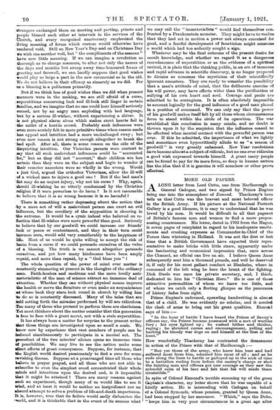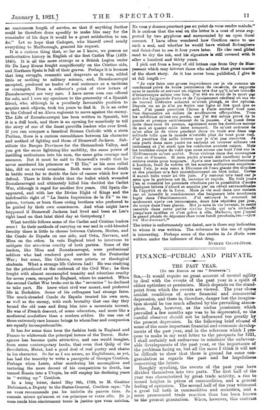MORE OLD PAPERS.
A LONG letter from Lord Cotta, one' from -Marlborough to General Cadogan, and two signed by Prince Eugene bring one into the atmosphere of Esmond. Thackeray's hero tells us that Cutts was the bravest and most beloved officer
in the British Army. If his picture at the National _Portrait Gallery is a good likeness, it is easy to understand that he was
loved by his -men. It would be difficult in all that pageant of Britain's- famous men and women to find a more prepos- sewing countenance. His letter, dated in 1703 from the Hague, is seven pages of complaint in regard to his inadequate emolu- ments and crushing expenses as Commander-in-Chief -of the Forces then wintering in Holland. It was not the first or last time that a .British Government have expected their repre- sentative to make bricks with little straw, apparently under the fascinating and economical impression that, once across the Channel, an official can live on air. I believe Queen -Anne subsequently sent him a thousand pounds, and well he deserved
it, if only for his most gallant- conduct at Blenheim, where in command of the left wing he bore the brunt of the fighting. Dick Steele was once his private secretary, and, I think, dedicated -to him his " Christian Hero." He is one of those attractive personalities of whom we =know too little, and of whom we catch only a fleeting glimpse as the panorama of history fades from sight.
Prince Eugene's unformed, sprawling handwriting •is almost that of -a child. He was evidently no scholar, and it needed the clash of arms to bring out his great qualities. Esmoni says of him
In the hour of battle I have heard the Prince of Savoy's officers say, the Prince became possessed with a sort of warlike fury ; his eyes lighted up ; he rushed hither and thither, raging ; he shrieked curses and encouragement, yelling and harking his bloody war dogs on and himself at the f 'rat of the hunt."
How wonderfully Thackeray has contrasted the demeanour in action of the Prince with that of Marlborough i---
" But yet those of the- army, who knew him best and had Buffered most from him, admired him most of all ; and -as he rode along the lines to battle or galloped up in the nick of time to a battalion reeling from before the enemy's charge or shot the fainting men and officers got new courage as they saw the splendid calm of his face and felt that his will made them irresistible."
In spite of Colonel Esmond'a terrible summing up of the grea4 (laptain's character, my letter shows that he was capable of a kindly action. Ho is interceding with Cadogan on behalf
of a, Colonel Symonds, whose pension, granted by Queen Anne, had been stopped by her successor. " Which," says the Duke, "keeps. him in very poor circumstances in a great age after an uncommon length of service, so that if anything further could be- therefore done speedily to make him easy for the remainder of his days it would be a great satisfaction to me, tem" Let us hope that Cadogan, who himself owed nearly everything to Marlborough, granted his request.
It is a curious thing that, so far as I know, we possess no authoritative history in English of the first Carlist War (1833- 1840). It is all the more strange as a British Legion under Sir De Lacy Evans fought magnificently on the Cristino side, and Northern Spain is lull of their graves. Perhaps it is because that long struggle, romantic and desperate as it was, added little or nothing to military science,. and, Zumalacarregui excepted, produced no leader of real eminence as a tactician or strategist. From a collector's point of view letters of Zumalacarregui are very rare. I have never seen one offered for sale, and I owe my specimen to the generosity of a Spanish friend, who, although in a peculiarly favourable- position to acquire such objects, took ten years to find it. It is an order to the Colonel of an Alava, regiment to move against the enemy. The Life of Zumalacarregui has been written in Spanish, but it is a dull book, and there is an opening for somebody to tell the story of one of the finest guerrilla leaders who ever lived. If you can compare a fanatical Roman Catholic with a stern Puritan, there is a curious resemblance between his character and method of fighting and those of Stonewall Jackson. Sub- stitute the Basque Provinces for the Shenandoah Valley, and you get the same lightning-like mobility, the same power of instilling enthusiasm into his men, the same grim courage and resource. But it must be said to Stonewall's credit that he never murdered his prisoners as " El Tio," as his men called him, did on several occasions. Both were men whose death in battle went far to decide the fate of causes which few now defend. There is little doubt that the bullet which wounded Zumalacarregui and _ultimately killed him decided the Carlist War, although it raged for another five years. Old Spain. dis- appeared, and. with her the Divine Right of Kings and the indefeasible right of " La Santa Inquisition de in Fe " to im- prison, torture, or burn those erring brothers who preferred to be guided by their own consciences. And what might have happened if Stonewall Jackson had lived and been at Lee's right hand on that fatal third day at Gettysburg ?
What terrible fellows some of the Carlist and Cristino leaders were ! In their methods of carrying on war and in cold-blooded ferocity there is little to choose between Cabrera, Merino, and the Conde de Ripens' on one side, and Ores, Narvaez, and Mina on the- other. In vain England tried to intervene to' mitigate the atrocious cruelty of both parties. Some of the leaders, like- Mina and Zumalacarregui, were professional soldiers who had rendered good service in the Peninsular War ; but - some, like. Cabrera, were priests or theological students. What a strange life Cabrera had! He was studying for the priesthood at the outbreak of the Civil War ; he then fought with almost unexampled tenacity and relentless cruelty for seven years, escaped to England, where he married. When the second Carlist War broke out in the " seventies " he declined to take part. He- knew what civil war meant, and preferred life in Berkshire. Some of his colleagues had strange fates. The much-dreaded Conde de Espana treated his own men, as well as the enemy, with such brutality that one day they bound the old man and flung him into a mountain torrent. He was of French descent, of some education, and more like a mediaeval condottiere than a modern soldier. He was one of those extremely rare human beings to whoinfear and compassion are equally incomprehensible.
It has .for some time been the fashion both in England and France to whitewash the principal heroes of the Terror. Robe- spierre has become quite attractive, and one would imagine, from some contemporary books, that even that Quip of the Revolution, Marat, had a good deal of real poetry and charm in his character. So far as I am aware, no Englishman, as yet, has had the temerity to write a panegyric of Georges Couthon. Perhaps when Lenin, after murdering his accomplices and 'torturing the more decent of his compatriots to death, has turned Russia into a Utopia, he will employ his declining years in " writing up " Couthon;
In a long letter, dated May 9th, 1789, to M. Gaultier Dubianzet, a Deputy to the States-General,. Couthon says: "Je ne vous recommends pas les interets du pauvre tiers. Je connais mieux qu'auoun et vos principee et votre zole. Et je vous rends bleu sincerement toute Is justice que vous moritez. Ne vous y dormer ponrtant pas an point de vons rendre malade." It is curious that the seal on the letter is a coat of arms sup- ported by two gryphons and surmounted by an open ducal coronet. I have often wondered how Couthon came to use such a seal, and whether he would have wished Robespierre and Saint-Just to see it four years later. He also used gilded sand to dry the ink, and his signature is still covered with it after a hundred and thirty years.
I pick out from a heap of old letters one from Guy de Man, peasant which may interest those who admire that great master of the short story. As it has never been published, I give ifs at full length :-
" Je vide faire une grease imprudence oar je via comma un condamn6 prive de toute permission de oauseris, de rapport* avec le monde et suivant un regime tree dui qu'il re'est interdit d'interrompre memo une foie. J'ai ate au seuil de is mort pet suite dm _fatigues de Paris et de l'epuisement cerebral oh ma vie de travail litteraire scheme m'avait ?lenge, et dos opium& Depuis un an je n'ai pu 6orire une ligne nil lire quoi quo to seat. J'ai passe penitent l'biver 4 Paris sentant tout mon etre disparaitre an milieu de souffrances effroyables. Toua les medecins m'ent ern perdu, oar j'ai 4t6- memo prive de Is parole et presque entierement de la pewee. J'ai passe deux mois dans mon lit presqu, agonisant avec les dooteurs autour de moi et quatre mots sans. sommeil. Its m'onb ordonn6 de m'en idler et de vivre pendant deux ou trois ans dans r:ir solitude tells que le monde n'existat plus du tout pour r J'ai peutetro die mile lettres que je n'ai pas ouvertes.
suis parti dans mon yacht ne sache.ut ea trouver ailleurs oet isolement et j'ai senti quo lea medecins avaient raison. Mais
lea terribles coups de vent que none evens eus tout Vete, sur InMediterranee m'ent arrete. Nous vivions dans des montagnes d'eau et- d'ecume. Si mon yacht n'avait 6t6 excellent nous y serions mates pour toujours. Apres une tentative malheureuse Luchon, fond de volcan ea les sources sulfureusea emprisone nent l'alr, je anis venu 4 Divonne oa l'eaudes douches et des Oscines m'a fait immediatement un blibet34einflui. Cedes it aurait fallu venir ioi des juin. J'y reaterai tree turd oar je sons que la guerison est la, certain et rapids. En hult joure j'en ai constate les premiers Eliminate par la possibilit6 d'eorire quelques lettres d'abord et ensuite par un reveil extraordinaise de l'appetit et de la force. Main je vie semi dans tine maison oar on interdit le coudoiement des baigueura tree nombrewt loges dans Petablissement. J'ai retrouve is sommeil tel seulement apres ces immersions, deux lois repethea par jour, du corps dans l'eau glacee. Moi je sena la vie revenir, is sant4 renaltre dans mat)• petite riviere froido qui m'a rechauffe jusqu'aux moelles et o'eat grace b elle, Madame, que j'aural le grand plaisir de dejouner chez vows lundi proohain,eto.—Gow
DE MAUPASSANT."
The letter is unfortunately not dated, nor is there any indication to whom it was written. The reference to the use of opium is interesting. Perhaps some of the stories in Le Horia were written under the influence of that drug.
EVELYN GRANT-DUEY











































 Previous page
Previous page